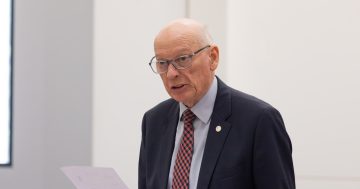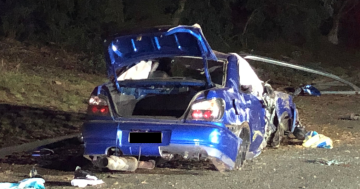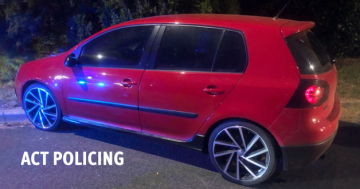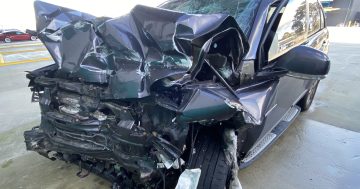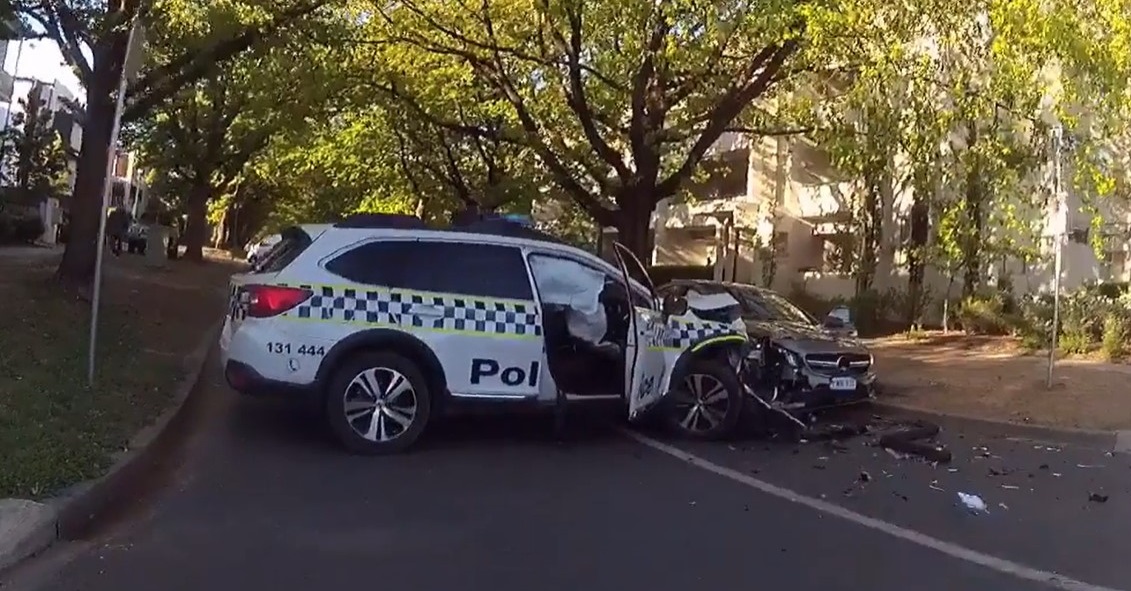
This police car was significantly damaged when it was rammed by a stolen Mercedes Benz. Photo: AFPA Facebook.
Drivers charged with serious offences could soon have their presumption of bail in the court removed under a push by a Labor backbencher.
Murrumbidgee MLA Dr Marisa Paterson put forward a motion to the Legislative Assembly on Wednesday (28 June) calling for the presumption of bail to be shifted to ‘neutral’ for three crimes: culpable driving of a motor vehicle, driving a motor vehicle at police, and furious, reckless or dangerous driving.
“Shifting the presumption of bail to a neutral one for these most serious offences will position these crimes alongside manslaughter, sexual assault crimes and drug trafficking crimes,” she said of her Bail Amendment Act 2023.
“This amendment will require the judiciary to not presume bail and to assess all the available evidence in the bail application as to the public safety risks that this person may present.”
She highlighted statistics from ACT Policing’s Operation TORIC – which was formed to combat dangerous and recidivist driving offending on Canberra’s roads – showing police had caught 248 offenders and charged them with more than 596 offences between 1 August 2022 and 25 April 2023.
More than 40 per cent of these people were on bail and another 22 per cent were subject to good behaviour obligations from the court – such as drug alcohol treatment orders, good behaviour orders, intensive correction orders and parole.
“There [are] many cases where people have been charged with serious offences over and over again [and are being] released on bail,” Dr Paterson said.
“These cases highlight the flaws in the bail system, and how the recidivist drivers continue to break the law and put community lives at risk.”
The inquiry into dangerous driving heard evidence around the impacts of high-risk offending while perpetrators are on bail, with the committee recommending a neutral presumption of bail for serious driving offences.
Dr Paterson said by shifting the presumption of bail for these crimes to neutral, the courts would be able to make more balanced decisions when granting or denying bail to accused offenders.
“The primary objective of [this motion] is so the bail applications of these people, who commit the most serious of driving crimes, receive the scrutiny they deserve,” she said.
“This is neither a leaning towards a granting of bail nor a denial of a grant of bail, but rather places the decision-making power firmly in the hands of the judiciary.”
She acknowledged the importance of human rights when considering her amendments, and said they aligned with the right to life and ensured the safety of the community and individuals was also protected and preserved.
Dr Paterson also urged the government to adopt other recommendations from the inquiry, looking into more education, support and intervention programs for high-risk offenders.
The move has been supported by the Australian Federal Police Association (AFPA), with its president Alex Caruana stating it was “refreshing” to see an ACT politician working to look after the welfare of police and make Canberra’s roads safer.
“Vehicular (and attempted vehicular attacks) are a constant fear playing in the back of police members’ minds,” he said.
“In the ACT, we’ve had too many close calls when people have deliberately driven at police officers. It’s been pure luck that there hasn’t been a member killed by this dangerous behaviour.”
Mr Caruana said the target on police officers’ backs were “often” downplayed by the judiciary and the public, and they faced daily threats to their lives.
“If someone chooses to drive at police deliberately, this intent must be acknowledged at all stages of the judicial process,” he said.
“If a person deliberately sets out to harm a police officer, they don’t deserve the presumption of bail.”
He said the three crimes being considered by Dr Paterson’s motion fit within the scope of offences that contributed to people either dying or being seriously injured on the road, and off the back of 18 people being killed on Canberra’s roads in 2022, it was time for change in this space.
“This Bill doesn’t preclude bail, nor would it mean that more people would be incarcerated. People can still apply for bail,” Mr Caruana noted.
“What it means is that the prosecutors could contest a bail application on equal footing, and the judiciary could then assess each bail application objectively.”
Dr Paterson’s motion will be debated in the Legislative Assembly at a later date.














